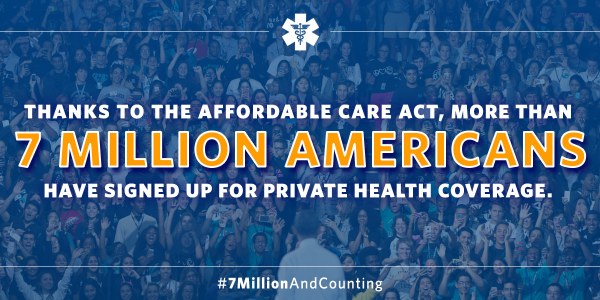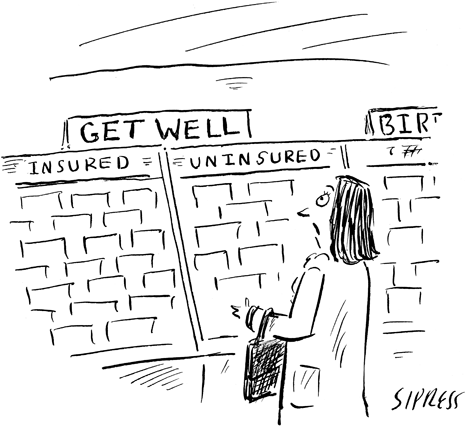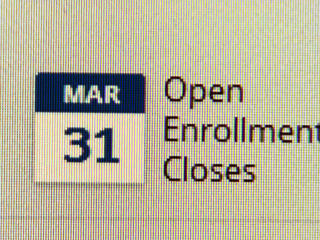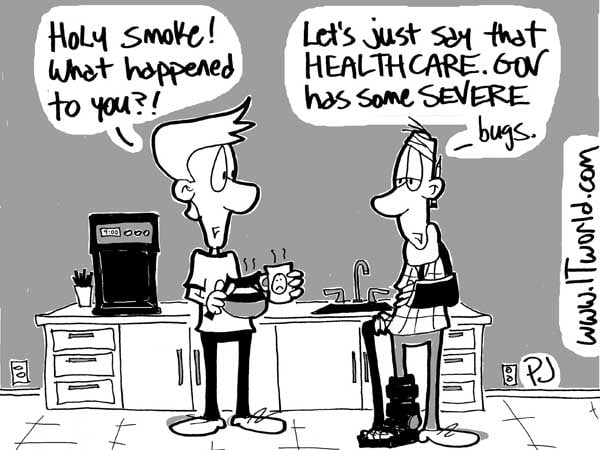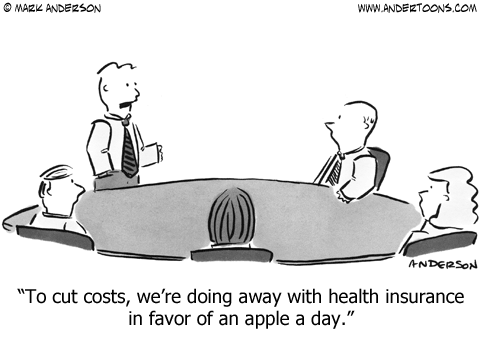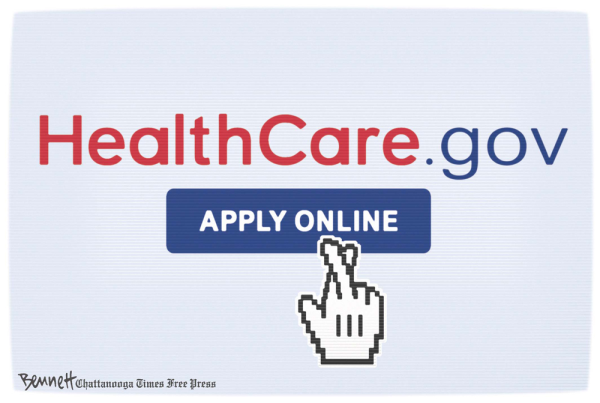President Barack Obama celebrated the end of the Affordable Care Act’s first open enrollment period by announcing that at least 7.1 million Americans have signed up for insurance through exchanges. "No, the Affordable Care Act hasn’t fixed our long broken health care system, but this law has made our broken system a lot better," Obama said before a large and happy crowd Tuesday afternoon in the Rose Garden. The tally is based on the number of people who enrolled for coverage by Monday’s deadline through the new federal insurance marketplace operating in three dozen states. It also includes people who enrolled in 14 state-run marketplaces as of the deadline or, in the case of a few states, by last weekend. The Census Bureau estimates that 47 million Americans went without health insurance last year, more than 15 percent of the population. White House press secretary Jay Carney said Tuesday that the administration expects that the final numbers will also show sharply higher enrollment by young adults, though demographic breakdowns by race or age will not be available for days or weeks, and he was unable to say how many of the enrollees were previously uninsured. The law’s impact on the uninsured, he said, was intended to be measured over three years.
Medical Billing Blog
According to study, America has 32 million underinsured.
As Monday's deadline to sign up for health insurance or face a penalty approaches, there's plenty of attention on the uninsured. But how about the underinsured? A new report finds that 32 million people were underinsured in the U.S. in 2012, meaning their health insurance didn’t do enough to protect them from major medical costs, according to a new report from the Commonwealth Fund. That makes for 80 million Americans who either have no health insurance at all, or who don’t have enough, the report finds. The Affordable Care Act insurance reforms seek to expand coverage and to improve the affordability of care and premiums.
Doctors Say Grace Period Will Leave Them With Unpaid Bills
The American Medical Association issued a statement to physicians on Wednesday cautioning doctors on how to navigate a 90-day grace period for government-subsidized health plans. A patient with subsidized insurance who is falling behind in payments is guaranteed coverage for medical bills for 30 days – but insurers can ultimately deny payment during the remaining 60 days. Some doctors and the AMA say insurance companies could delay and then retroactively deny claims made during the 60-day period – a bill then held stuck with physicians.
Kathleen Sebelius, the secretary of health and human services, said Wednesday that the Obama administration would not extend the deadline for people to sign up for health insurance or delay the requirement for most Americans to have coverage. There will also be no delay in the penalty most Americans face under President Barack Obama's healthcare reform law if they fail to obtain health coverage this year. Last year, embracing nonpartisan estimates for the Affordable Care Act, Health and Human Services Secretary Kathleen Sebelius set a benchmark for the new insurance marketplaces: "Success looks like at least 7 million people having signed up by the end of March 2014," she said to NBC. Enrollment, however, began at a terribly slow pace in October because of all the technical problems with HealthCare.gov, the federal health exchange website serving 36 states. Some state-run health exchange websites have had their own problems as well. Within that context, Sebelius on Wednesday redefined what success looks like: "Success looks like millions of people with affordable health coverage, which we will have by the end of March," she told the House Ways and Means Committee. The administration released the latest enrollment figures on Tuesday—revealing that some 4.2 million Americans have signed up for coverage on the new exchanges. However, that figure does not include how many people have actually paid for their plans—a metric that could make the actual number of enrollees significantly lower.
Obama Administration Unveils New Affordable Care Act Changes… again.
The Obama administration announced Wednesday that it has rewritten an array of far-reaching rules under the Affordable Care Act, the most significant of which will let people keep bare-bones health insurance policies for three more years. Americans with health insurance policies that don't meet consumer standards set by the president's healthcare law would be allowed to keep their plans into 2017, three years later than originally envisioned, so that people can buy these noncompliant plans through October 2016 and be covered by them until the following September, when Obama’s tenure in the White House will have ended. The healthcare law was designed to phase out health insurance plans in 2014 if they did not include a basic set of benefits and limits on how much consumers can be required to pay out of pocket for their medical care. After the controversy broke, the administration announced in November that state regulators could allow insurers to renew old policies in 2014. Only about half the states have agreed to the extensions. Some, particularly those with liberal, Democratic insurance regulators, have balked at allowing what they consider substandard plans to remain on the market.
Now Available: Subsidies for Insurance Policies Bought Outside Exchange
With just a month left for Americans to select health plans this year through new insurance marketplaces, the Obama administration is bending some rules to prevent people from being stranded without coverage, especially those in states where their own state-run online exchange has failed disastrously. The new policy applies to people who — because of “technical issues” — were prevented in trying to buy insurance through an online exchange and signed up for a health plan outside the marketplace. They will now be allowed to sign up for coverage in the exchange and get federal subsidies “on a retroactive basis,” going back to the date on which they first enrolled in a health plan outside the exchange. The state-run exchanges in some of these states — Oregon, Maryland, Massachusetts and Hawaii in particular — have experienced more technical problems than even the federal website. Consumers in those states are still having difficulty enrolling five months after the launch. Federal officials said they had agreed to provide such assistance retroactively because technical problems had prevented consumers from using online exchanges to obtain insurance and financial aid in some states. The Obama administration’s decision came as a surprise because the Affordable Care Act is clear: Federal subsidies are available only to people who enroll in a “qualified health plan” through an exchange. The HHS change will allow those who tried to sign up on their state-run exchanges, but couldn’t, to retroactively obtain the subsidies they would have been eligible for, even if they ended up purchasing healthcare through a private insurer. The privately purchased plans must still meet certain basic requirements of the healthcare law.
Marketplace Enrollment Update: February 2014
Enrollment in health plans sold on marketplaces created by President Obama’s health care law has hit 4 million, the administration announced Tuesday, marking another milestone in the law’s implementation. The number suggests sign-ups have continued at a brisk pace in February, with about 700,000 people selecting an insurance plan so far this month. And with five weeks before the enrollment period deadline at the end of March, they put the administration on pace to come close to the Congressional Budget Office's initial projection that 7 million individuals would sign up for insurance coverage during the period. Health officials continue to see “strong demand nationwide” and that more than 12 million calls have come into the federal call center since the fall. But with the good news remain some questions. The number of people who have signed up for plans and paid their first month's premium remains unknown, though insurers have suggested about 20 percent of individuals have not paid. Moreover, it is unclear how many of those individuals who signed up in February were young and healthy -- the population demographic that the administration needs to ensure that the exchanges have a stable balance of healthy and sick consumers. A senior administration official said that a more detailed report about the enrollees would be released in mid-March.
Marketplace Enrollment Update: January 2014
Approximately 3 million people have now enrolled in health insurance plans sold through marketplaces created by President Obama’s health law, the administration announced Friday. The milestone indicates nearly a million additional people have signed up since the end of December. It also suggests that the marketplaces are continuing to recover from a disastrous launch on Oct. 1. That still leaves the Obama administration lagging behind its initial projections for overall health law enrollment--but also closer to hitting monthly sign-up expectations it set back in September. The numbers are reassuring for supporters of the Affordable Care Act, who were worried that the pace of sign-ups for private plans would slow in January and February, before picking up again as the March 31 enrollment deadline for 2014 coverage approached. But they are still shy of initial projections from the Centers for Medicare and Medicaid Services, which originally expected 4.4 million people to sign up for a plan by the end of January. Moreover, the administration has not provided data on how many of the people who have signed up for plans through the exchanges have actually made a payment, which is required to ensure coverage.
Health Insurance in 2014: Lower Premiums but Higher Deductibles
Details are now available on the costs associated with health plans being offered through Healthcare.gov, and some people are finding their insurance will cost more than they had hoped. Until last week, the federal government blocked users from viewing deductible amounts associated with available health plans, limiting consumers to view only premium and copayment amounts. Insurers assumed consumers would pick plans mainly on price, as reflected in the monthly premium, so it was to their advantage, as well as to the government’s, that consumers were unable to view a plan’s annual deductible, or the amount consumers need to pay before coverage kicks in. The federal government finally relented and allowed consumers to basically ‘window shop’ for coverage. For policies offered in the federal exchange, the annual deductible often tops $5,000 for an individual and $10,000 for a couple. The average individual deductible for what is called a bronze plan on the exchange is $5,081 a year, according to a new report on insurance offerings in 34 of the 36 states that are relying on the federally run marketplace. While the costs of these plans are surprising many, they are more generous than what is currently available in the individual market. However, the plans are significantly less generous than what most employers are providing, creating a sticker shock sensation to consumers that are no longer receiving employer-sponsored health insurance.

